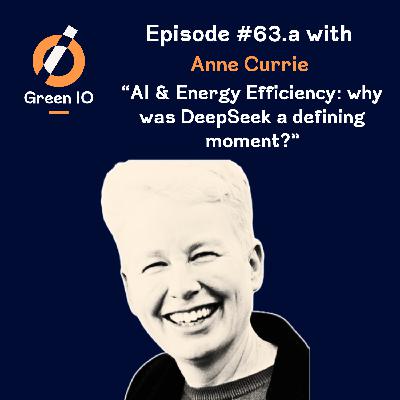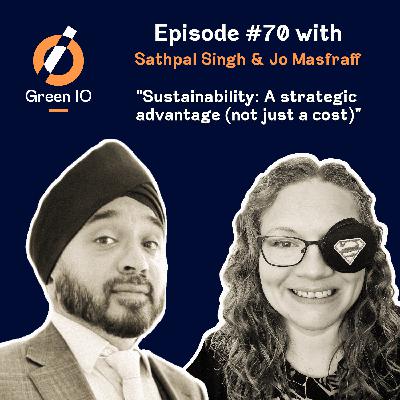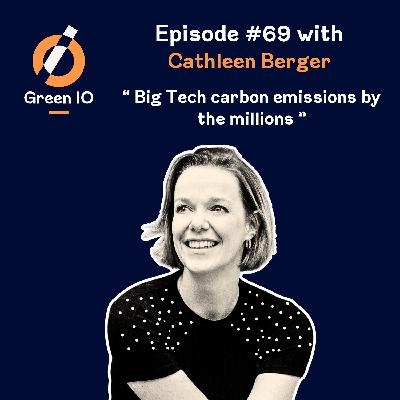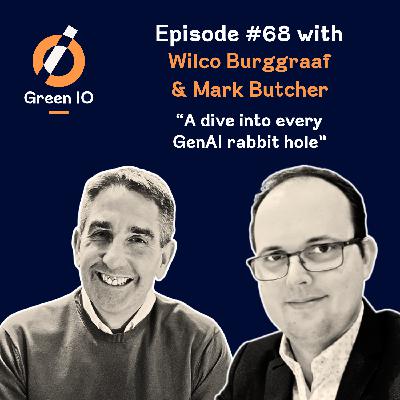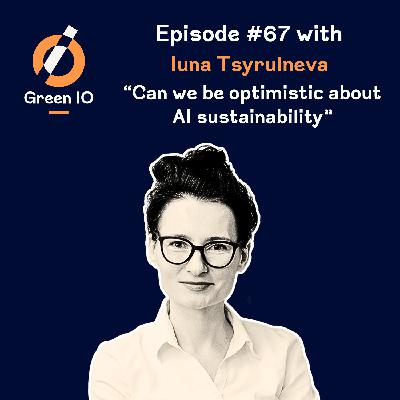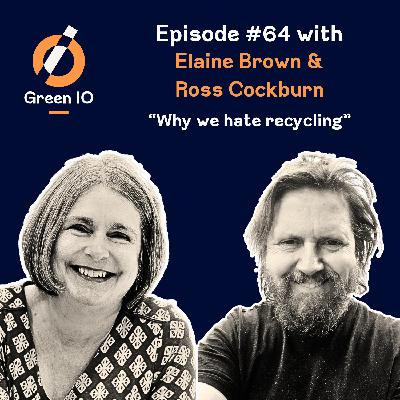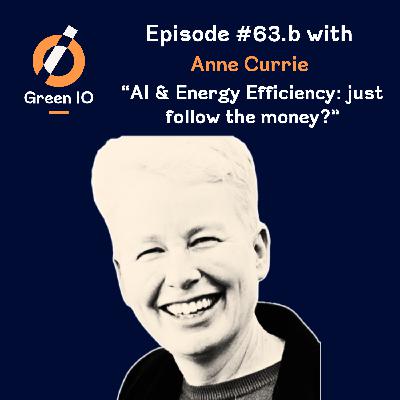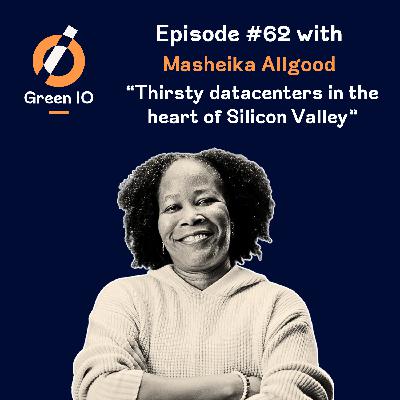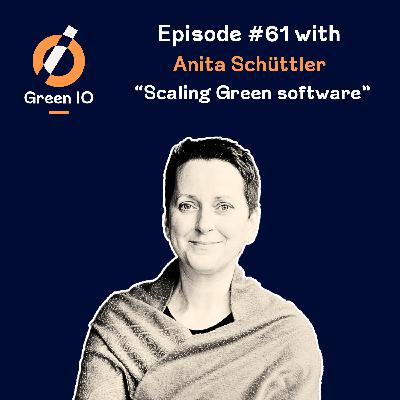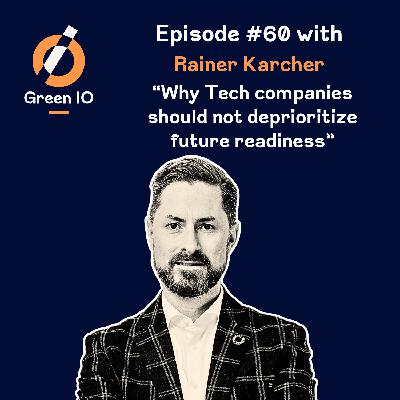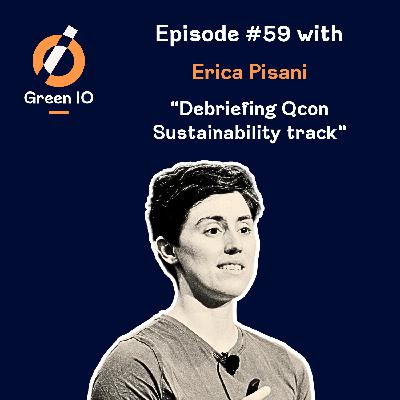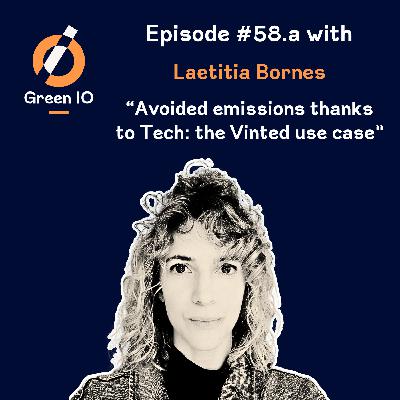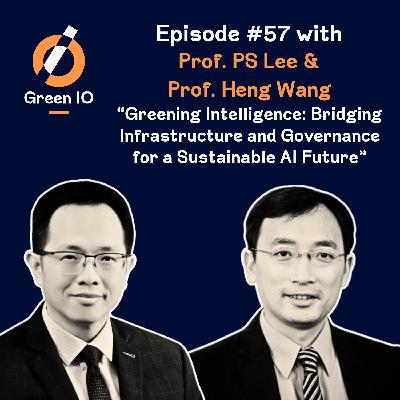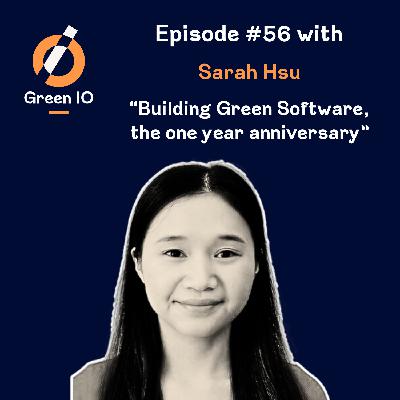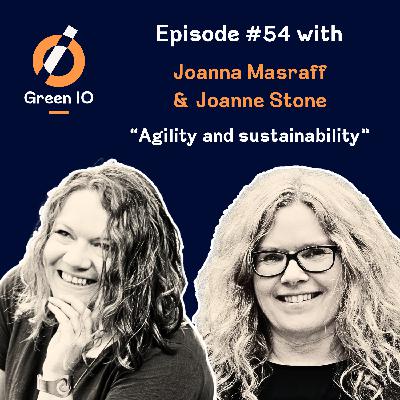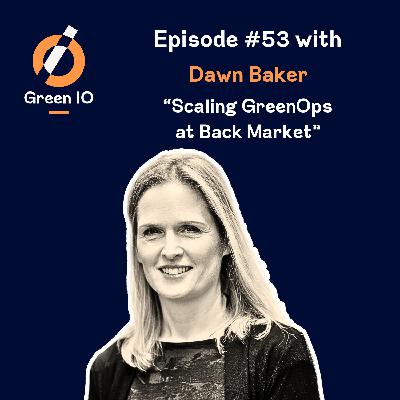#63a AI & Energy Efficiency: why was DeepSeek a defining moment? with Anne Currie
Update: 2025-09-02
Description
Anne Currie is the co-author of the acclaimed O’Reilly book “Building Green Software”, a pillar of the GSF, a veteran in the Cloud Industry and also a SF novelist with her series of panopticon books.
Preparing her forthcoming keynote at Green IO London, she went all the way down into the rabbit hole of AI and energy efficiency. She investigated from OpenAi to DeepSeek and open source models, what a software developer using these models can and cannot do to reduce energy consumption, and so on.
In the first part of this episode, Anne Currie et Gaël Duez discussed:
- AI scaling law and its brute force philosophy
- The DeepSeek pivotal moment (hint: not necessarily the product itself)
- 3 actions made by DeepSeek to optimize
- Open source & efficiency
And much more!
❤️ Subscribe, follow, like, ... stay connected the way you want to never miss an episode, twice a month, on Tuesday!
📧 Once a month, you get carefully curated news on digital sustainability packed with exclusive Green IO contents, subscribe to the Green IO newsletter here.
📣 Green IO next Conference is in London on September 23rd and 24th. Every Green IO listener can get a free ticket using the voucher GREENIOVIP. A small gift for your huge support. 🎁
Learn more about our guest and connect
📧 You can also send us an email at contact@greenio.tech to share your feedback and suggest future guests or topics.
Anne's sources and other references mentioned in this episode
- How China’s open-source AI is helping DeepSeek, Alibaba take on Silicon Valley
- Attention Is All You Need
- Powering China’s New Era of Green Electrification
- China continues to lead the world in wind and solar, with twice as much capacity under construction as the rest of the world combined
Transcript (auto-generated)
Anne (00:01 )
They realized was that the more compute they poured into training and running an LLM, the better he got, and it just kept getting better. So people were expecting we'll we'll pour in energy. And at some point we'll, get diminishing returns. You know, we'll go, well, that's the point where we, where we stop building the data centers, but they didn't discover that. They discovered that it just keep going up and up and up
Gaël Duez (00:19 )
It will plateau.
Gaël Duez (00:28 )
Hello everyone, welcome to Green IO! I'm Gael Duez and in this podcast, we empower responsible technologists to build a greener digital world, one bite at a time. Twice a month on a Tuesday, guests from across the globe share insights, tools and alternative approaches, enabling people within the tech sector and beyond to boost digital sustainability.
Do I really need to introduce Anne Currie to you? She's the co-author of the acclaimed O'Reilly book Building Green Software, a pillar of the Green Software Foundation, a veteran in the cloud industry, and also a science fiction novelist with a series of Panopticon books, which I didn't read yet, but I intend to catch up before Christmas. And we will have the honor of having her as a keynote speaker at Green IO in London on September 24th, where she will talk about AI and its energy consumption. And there's something to know about Anne. She's a thorough speaker. When you give her a bone, she will go all the way down into the rabbit hole. This is exactly what happened on this topic of AI and efficiency. She investigated from OpenAI to DeepSeek and open source models investigated what a software developer using these models can and cannot do to reduce energy consumption and so on and so on. And I realized it wouldn't be fair for the thousands of listeners of the show to be deprived of these insights. Hence this episode on a much complicated topic, AI and efficiency. Hi Anne and welcome back on the show because you're now part of the small club of guests who have been due time on the Green IO podcast. Congrats!
Anne (02:16 )
Well, thank you very much. It's great to be back. And I'm really looking forward to green IO should be an excellent conference. It looks like an amazing lineup.
Gaël Duez (02:27 )
I mean, you're part of it, so it must be. Listen, Anne, before we deep dive into this AI and efficiency discussion, I was listening to the Environment Viable episode, which you hosted with Sean Varley from the chip manufacturer, Ampere. It was super interesting to hear the discussion about which developers are actually able to leverage the true potential of a chip or all the hardware used to run the software on. Sean made a point that the hyper-specialized engineers building the serverless tools are more able to achieve significant results than a regular developer who has to deal with many business and technical requirements, the time constraint and so on and so on. And I guessed that it was… sort of music to your ears because you advocated during your discussion with him, but also in this podcast previously and in your book that building efficient software is actually super hard. So before we deep dive into AI and efficiency, could you elaborate a bit on this constant stance of yours?
Anne (03:39 )
Yes, so there are lots and lots of ways to cut your energy use in your systems, but I always say that for most enterprises, don't think about code efficiency. It's incredibly hard. It's a very, very specialized skill. There's tons of low-hanging fruit in operational efficiency. adopting modern ops practices will help you be more secure, will help you be more resilient not you're having just getting rid of the waste in your systems, turning things off when they're not in use or when you don't use need them anymore, getting rid of your zombie services. That generally will cut your energy use in half whilst making your systems more secure and more ⁓ and a lot cheaper to run half usually half as much to run. So that's for enterprises. I always say that look first there because the changes to use the less electricity are completely aligned with other business needs that you have. So it's worth it is worth a little bit of investment to cut your hosting costs in half and also to get a more resilient system. ⁓ rewriting your systems to be more efficient, that is a really specialist skill and it is not worth paying the kind of people who have the ability to do that in most enterprises. So what you really need to do there, this is where I was very aligned with Seth's statements which you're much better off, if you want efficient software, buy it. Buy it off the shelf, buy it managed, ideally already managed. If you're using a hyperscaler, buy a managed service off that. will also often, which is where obviously Seth wants to be selling his chips to those same people. So enterprises never need to get involved. They sell to the hyperscalers, the enterprises buy that chip from the hyperscaler wrapped in a managed service that might be serverless, might be something else. ⁓ And that's kind of that means everybody's aligned. Otherwise you end up with it's really hard. Many years ago, when I started my career, I was involved in writing high performance software in C, not because I was some super person doing that stuff, just because we had to because all the servers were really bad back then 30 years ago. And therefore you had to write really efficient software to get everything to run at all. And it took ages. These days, most enterprises, if you attempted to do that kind of work, you would go out of business. There are some ways that it can happen. And that is a little bit about what we're talking about today. ⁓ Some ways that enterprises can be involved or even individuals can be involved, but not… through your enterprise writing your own custom system. It's half the story of DeepSeek, which you asked me to look into a couple of months ago. So we come full circle on that. yes, my key thing is don't try to do something that isn't realistically going to happen because there are lots of things that every enterprise absolutely should be doing in terms of adopting modern ops best practice that will save loads of, realistically it's going to save you more electricity use than anything else you do.
Gaël Duez (07:01 )
Thanks a lot for clarifying that yet there are many, many, many things to be done before writing efficient code. Maybe we'll come back to this point later because doesn't mean
Comments
In Channel

